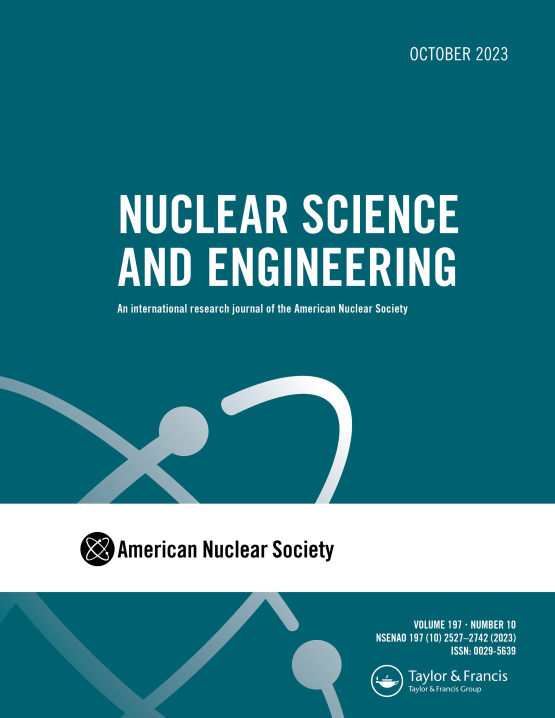Submit a Manuscript to the Journal
Nuclear Science and Engineering
For an Article Collection on
Scientific Machine Learning for Nuclear Engineering Problems
Manuscript deadline


Article collection guest advisor(s)
Prof. Dr. Xu Wu,
Department of Nuclear Engineering, North Carolina State University, USA
xwu27@ncsu.edu
Prof. Dr. Yang Liu,
Department of Nuclear Engineering, Texas A&M University, USA
y-liu@tamu.edu
Prof. Dr. Syed Bahauddin Alam,
Nuclear, Plasma and Radiological Engineering, University of Illinois Urbana-Champaign (UIUC), USA
alams@illinois.edu
Prof. Dr. Xingang Zhao,
Department of Nuclear Engineering, University of Tennessee, USA
xzhao47@utk.edu
Scientific Machine Learning for Nuclear Engineering Problems
Artificial Intelligence (AI) and Machine Learning (ML) have achieved tremendous success in traditional tasks such as computer vision, natural language processing, speech recognition, and audio synthesis, where the datasets are in the format of images, text, spoken words and videos. Meanwhile, their applications in engineering disciplines mostly focus on scientific data that takes a numerical format and represents certain physics, which resulted in a burgeoning discipline called Scientific Machine Learning (SciML). SciML brings together the complementary perspectives of computational science and ML to craft a new generation of ML methods for complex applications. This article collection will focus on innovative developments and trustworthy applications of SciML for nuclear engineering problems.
Recent performance breakthroughs in ML, including advances in deep learning algorithms and the availability of powerful, easy-to-use ML libraries, increasing computational power and availability of data have led to unprecedented interest in SciML among nuclear engineers. SciML is considered a part of data-driven modelling, which has been revolutionizing our understanding and discovery of the real world that used to be solely relying on physics-based modelling. However, the full potential of data-driven SciML has yet to be fully realized. One barrier is that existing ML methods often do not meet the application standards of nuclear engineering problems. Application-agnostic algorithms, or those designed for more traditional ML applications such as computer vision and natural language processing, cannot be directly applied to scientific data in high-consequence nuclear engineering problems without non-trivial, task-specific modifications. Therefore, this article collection seeks to advance the trustworthy applications of SciML algorithms in nuclear engineering problems.
Full papers in the following subject are welcomed:
- SciML applications in nuclear engineering single physics (neutronics, thermal-hydraulics, fuel performance, etc.) and coupled multiple-physics modeling & simulations.
- Novel techniques and applications of SciML in nuclear engineering scientific computing problems, such as uncertainty/sensitivity/assimilation/validation analysis, reduced order modeling, inverse problems, dimensionality reduction, etc.
- New developments in SciML applications for current and advanced nuclear reactor operation & maintenance, such as anomaly detection, digital twins, diagnosis and prognosis, etc.
Prof. Dr. Xu Wu is the principal investigator of the ARTISANS (ARTificial Intelligence for Simulation of Advanced Nuclear Systems) research group at the Nuclear Engineering department of North Carolina State University. The research in the ARTISANS group revolves around uncertainty quantification and scientific machine learning. The goal is to combine SciML, experimentation and modelling & simulation into a unified approach to improve the predictive capabilities of computer models and enable reduced reliance on expensive measurement data.
Prof. Dr. Yang Liu is an assistant professor of nuclear engineering at Texas A&M university, where he leads the Scientific Machine learning for Advanced Reactor Technologies (SMART) group. His research areas include physics-informed machine learning; model uncertainty quantification and data assimilation; and intelligent control, optimization, and modelling for advanced reactor systems.
Prof. Dr. Syed Bahauddin Alam is an Assistant Professor of Nuclear, Plasma and Radiological Engineering (NPRE) at the University of Illinois Urbana-Champaign (UIUC). His research interests include Digital twins, real-time monitoring, virtual sensors, and AI/ML algorithms development for nuclear systems.
Prof. Dr. Xingang Zhao is an Assistant Professor of Department of Nuclear Engineering, University of Tennessee. His research interests include Instrumentation and controls, computational thermal hydraulics, prognostics and health management, reactor and systems engineering, safety and reliability analysis, Artificial intelligence & machine learning, digital twin, data analytics, validation and verification, uncertainty quantification, sensitivity analysis, optimization, high performance computing, Decision science, techno-socio-economic analysis, life cycle assessment.
All manuscripts submitted to this Article Collection will undergo a full peer-review; the Guest Advisor for this Collection will not be handling the manuscripts (unless they are an Editorial Board member).
Please review the journal scope and author submission instructions prior to submitting a manuscript.
The deadline for submitting manuscripts is 26 November 2025.
Please contact Agnes Zhou at Agnes.Zhou@taylorandfrancis.com with any queries regarding this Article Collection.
Please be sure to select the appropriate Article Collection from the drop-down menu in the submission system.
Benefits of publishing open access within Taylor & Francis
Global marketing and publicity, ensuring your research reaches the people you want it to.
Article Collections bring together the latest research on hot topics from influential researchers across the globe.
Rigorous peer review for every open access article.
Rapid online publication allowing you to share your work quickly.
Submission Instructions
All manuscripts submitted to this Article Collection will undergo desk assessment and peer-review as part of our standard editorial process. Guest Advisors for this collection will not be involved in peer-reviewing manuscripts unless they are an existing member of the Editorial Board. Please review the journal Aims and Scope and author submission instructions prior to submitting a manuscript.
